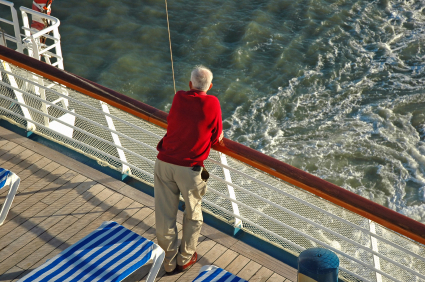One of the really nice things about a satisfying retirement is the freedom that comes from deciding how you live or even where you spend your time. Some of us are happiest staying where we are now, with an occasional trip to add new experiences to our lives. A few weeks ago I interviewed Barbara Torris on the snowbird lifestyle. She and her husband spent half the year in Tucson and the other six months in Portland, Ore. Shortly after that post appeared, Bill and Wendy Birnbaum came through town and showed us their RV … home for the next two months of travel away from their normal habitat in central Oregon.
These approaches are tremendously attractive. They combine stability with adventure. But, what about those retirees who have decided to really break the mold? Not too long ago the Wall Street Journal had a story about folks who have picked, shall we say, more unusual retirement options. A few other news stories that filtered across my desk make it obvious that a "traditional" choice may not be so obvious. Consider these:
Live on a Ship
For roughly the same monthly cost as a typical full service retirement community, a small but growing number of people are living for several months a year on cruise ships. A recent research study concluded that the services on a typical cruise are comparable to those in a retirement community: dining choices, escorts to dances and dining, help with doling out medicines, and daily housekeeping. Cruise ships have a doctor and nurses on board and on call 24/7, as well as a decently outfitted medical facility without worrying about health insurance or co-pays. Entertainment, fitness centers, libraries and satellite TV complete the package.
Between cruises, those who have adopted this lifestyle stay with friends or in a short-term apartment rental or hotel. Of course living space is at a premium, but as a trade off you spend your time visiting fascinating locations anywhere in the world.
Spend Part of the Year as a Park Ranger
This retirement lifestyle could be considered a type of snowbird living. Folks spend the summer months living in an RV while serving in volunteer capacities at national or state parks. Usually the rental fee for the camping space is free, or deeply discounted in exchange for the help. The volunteers may serve as managers of a camping/RV site, teaching interpretative classes, or working in a gift shop. The story I heard was of a couple that spent last summer at Yellowstone, the previous summer at Yosemite, and plan to be at Mt. Rainier this year. During the winter months they pull the RV to a warmer climate or spend time visiting friends.
Share Housing with Others
If you have an interest in living communally, this may work for you. Residents of these communities have private living spaces, but share kitchen and other facilities. There are now a handful of such senior developments in the U.S. with more in other countries. I have read predictions that most metropolitan areas will have at least one co-house development within the next decade. Especially for those who have lost a partner or have no nearby relatives, the sense of family and of sharing one's life with others are major draws.
Just as I was completing this post I received a press release from a lady who has written a book about this trend, especially for older, single women. If you'd like to learn more, the information is here.
Live in Another Country
Moving to a place like Costa Rico, Mexico, Belize, or anywhere else in the world is becoming a reasonable choice for many. Estimates are that over half a million Americans are spending their retirement years outside their home country. The primary reason is cost. Health care is usually 50 to 80 percent less expensive with comparable care. Many doctors in Central or South America, for example, are trained in American schools. Larger cities have modern hospitals and clinics. Housing is usually much less expensive, too. Social Security checks can usually be sent to you, though the rules vary by country.
Another reason folks choose to pull up stakes and start over again is the desire for adventure and a fresh start. Retiring to another country is a major decision that requires serious thought and preparation. It is not something to be done on a whim. Learning a new language and customs while fitting into a new culture can be daunting to some, but amazingly stimulating for others.
I've just scratched the surface on this topic. Additional options include some form of extended volunteer work, like the Peace Corps, or building a small apartment on the property of grown children to create a multigenerational situation without sacrificing privacy.
The cruise ship living and RVing in a National Park ideas strike me as something Betty and I might want to explore. What I'd like to know is what do you think? Are any of these ideas (or others I haven't mentioned) logical alternatives to aging in place or a typical retirement community?
It is kind of exciting that we do have options.









